She started a pottery brand that feeds street kids in Vietnam – all because of a hotel cup she used on holiday
A beach holiday in Hoi An took an unexpected turn for this former teacher, inspiring her to start an ethical pottery brand that both supports Vietnamese women artisans and street kids who might otherwise be scavenging through rubbish bins for their next meal.
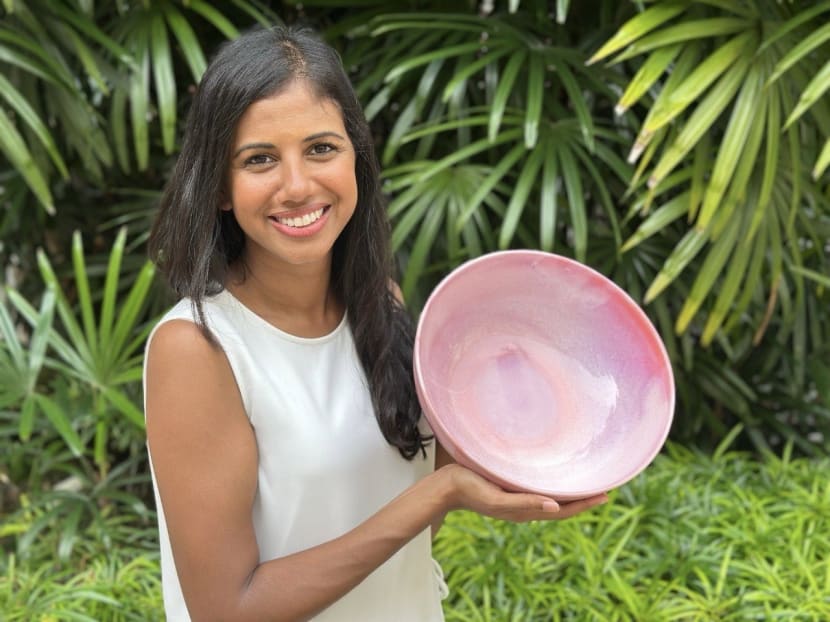
One cup sold at Lily and Sophia provides one meal to street kids in Vietnam. One bowl or plate provides two meals. One serving bowl (pictured) provides three meals. (Photo: Lily and Sophia)

This audio is generated by an AI tool.
It started with a wild goose chase. In 2016, when working in Hanoi, Vietnam, as an English teacher, Thushani Lovatt was enchanted by exquisite cups in a cafe. She was told they were made by female artisans at a woman-run pottery studio – said to be the first of its kind in Vietnam.
Three years later, the Londoner moved to Singapore and worked in a non-profit international school, United World College of South East Asia (UWCSEA) with her husband Tim.
The couple returned to Vietnam in 2023 for a beach holiday in Hoi An, with their two toddlers in tow. Yet again, she was smitten by handcrafted cups at her hotel and was told that they were made by a woman-run pottery studio.
Lovatt was intrigued. The cups from both her trips had to be from the same place.
“I asked where I could buy them. The waiter didn’t know. I asked him again the next day and the next day. Eventually, he found the address of a wholesaler,” the 38-year-old recalled.
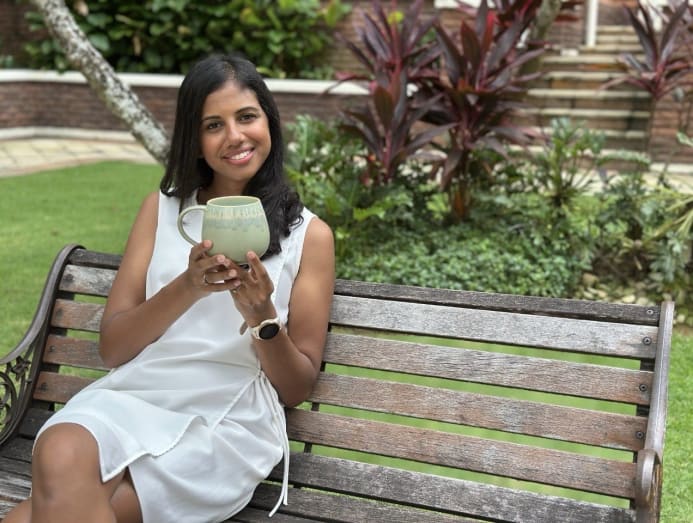
Interrupting her idyllic beach vacation, she took a Grab ride across paddy fields to the middle of nowhere with her one- and three-year-old daughters, where she bought six beautiful bowls.
But her obsession did not stop there. For reasons she could not explain, she felt compelled to find the artisans who made them.
After Google translating with a wholesaler who did not speak English, Lovatt was told to return the next day. She did, and was given the name of a small pottery studio. No website. No corresponding address on Google Maps. Another dead end.
With her holiday ending, Lovatt returned to Singapore. But she continued searching and chanced upon a random post with the pottery studio’s name on Foursquare. It felt like a long shot, but Lovatt asked a Vietnamese friend to make a trip to the address for her.
The studio had moved but her friend tracked them down to their new location and told Lovatt. The owner mentioned that they did exports, and that is how, in 2024, Lovatt became the unlikely founder of an ethical handmade pottery brand Lily and Sophia, named after her two children.
MEALS FOR CHILDREN
Her brand offers a small selection of handmade pottery by the women-run studio. Lovatt’s mission: To share these beautiful pieces with others, uplift the female artisans who made them, and help feed the street kids of Vietnam.
Every cup sold at Lily and Sophia provides one meal for a homeless child who might otherwise go hungry. Every bowl or plate sold provides two meals. Each serving dish, three meals.
“As a mother, it is really unbearable to think of street kids going hungry. If I can provide one meal for them, that matters. It’s not just a meal, it’s hope,” said Lovatt, who works with Blue Dragon Children’s Foundation, a Vietnamese charity that helps street kids and supports human trafficking victims in the country.
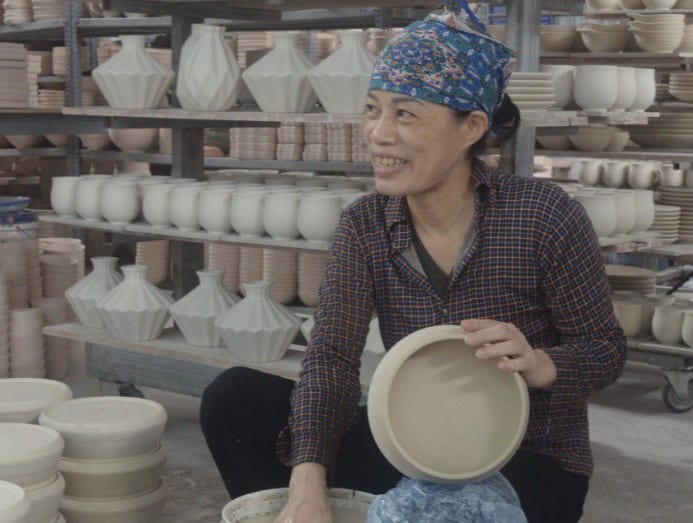
Each Lily and Sophia cup, bowl or plate takes 10 to 14 days to make, Lovatt added.
“In a factory, it can be made in seconds and every piece is the same. With a handmade item, we need to mould the clay, hand-mix the glaze to get the right colours, hand-dip the products in different glaze colours and dry them in the sun.
“They are then double-fired in the kiln so that they are dishwasher-, oven- and microwave-proof and long-lasting,” she told CNA Women.
Because they are handmade, each piece is unique, featuring small variations in size, thickness, symmetry, colour, pattern and texture.
“They are made by women who have been learning this skill, sometimes their whole life, sometimes through generations.”
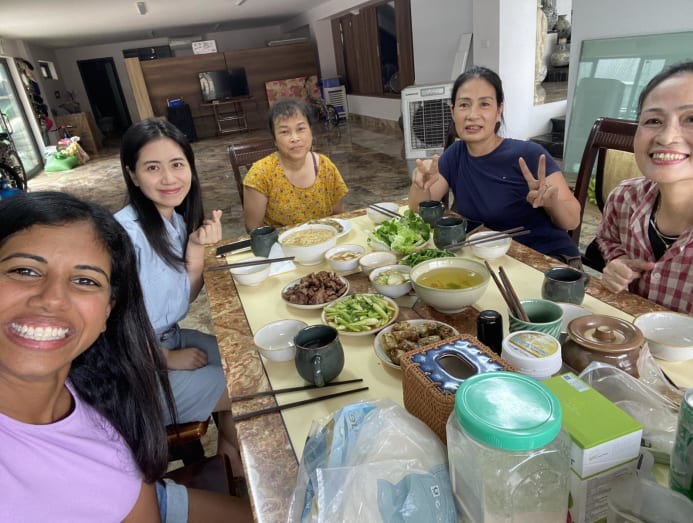
To ensure that these female artisans are fairly paid, she pays the pottery studio two to three times the average price it charges others for pottery.
“Business does not have to be profit-above-everything, winner-takes-all. I can make money to provide for my family, but so can others. You don’t need to be stepping on people to be making as much money as possible,” she said.
LOVE FOR A COUNTRY
These values are important to Lovatt. The British national had given up her well-paying job in pharmaceutical events to teach in Vietnam in 2016.
It was a complete culture shock at first – motorcycles everywhere, pho (noodles) sold from a small plastic bucket, people transporting three-seater sofas and selling live goldfish off the back of motorcycles. But what really struck her was the kindness of the Vietnamese people. She fell in love with the country.

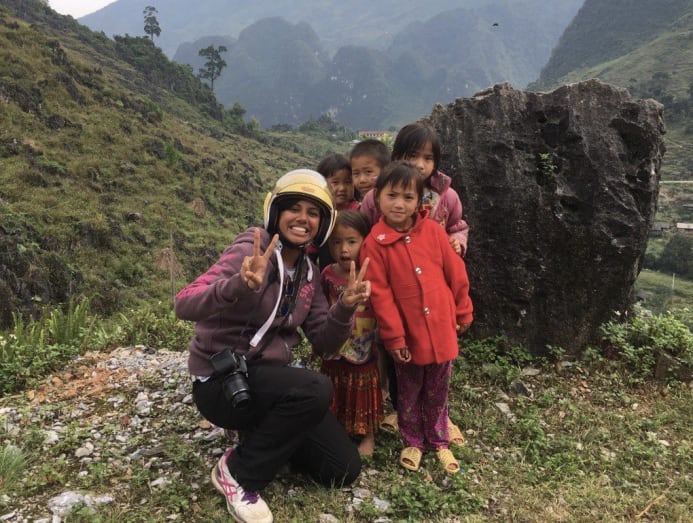
“On my first evening there with my husband, we were hungry. There weren’t many things on Google maps in the local area we were living, so we wandered through alleys looking for food. Eventually, someone asked us to come in. There were some tables so we assumed it was a restaurant.
“We didn’t speak any Vietnamese at that point, and he didn’t speak very good English. We tried to say the word “eat” with Google Translate and he gave us some delicious spring rolls. When we were about to leave, I tried to pay him for it, but he kept giving it back to me,” she recalled.
Later, when speaking to her landlord, she realised that this was not a restaurant but someone’s home. “A random person who didn’t speak our language saw that we were lost, opened up their home and fed us. I could not imagine that happening in London,” she reflected.
“Living in Hanoi fundamentally changed my values. I learned the power of caring about people that aren’t in your little unit. I wanted to be more like this, not just chasing the next thing,” she said.
What also really stuck with her was the poverty she witnessed.
“There were homeless people on the street,” she said. “We used to go to this local bun cha (grilled pork and noodles) place and noticed a mother with two little girls sleeping on the floor outside, burning rubbish to keep warm. We always gave her money. But I remember feeling quite helpless.”
Founding her pottery brand empowers Lovatt to make a more lasting impact.
FINDING PURPOSE FAR FROM HOME
Funded by her own savings, Lovatt started Lily and Sophia with 700 to 800 pieces, which she began designing from scratch with the Vietnamese artisans in March 2023. The pieces are inspired by her most memorable travels – an unforgettable lagoon, the colour of the ocean, aurora, petals, pebbles and seashells.
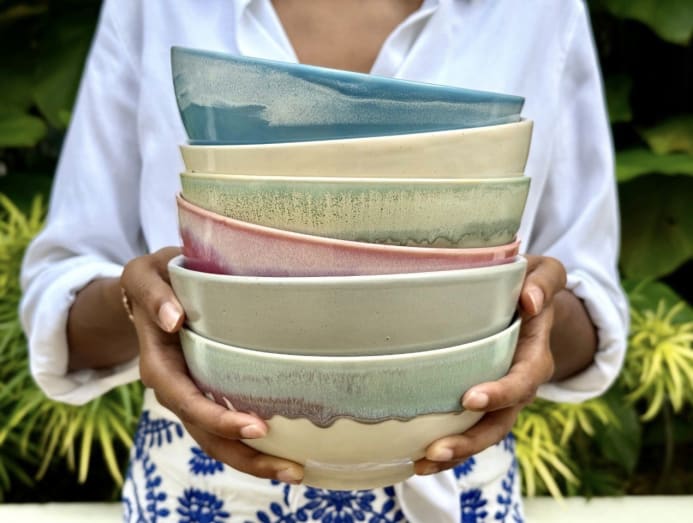
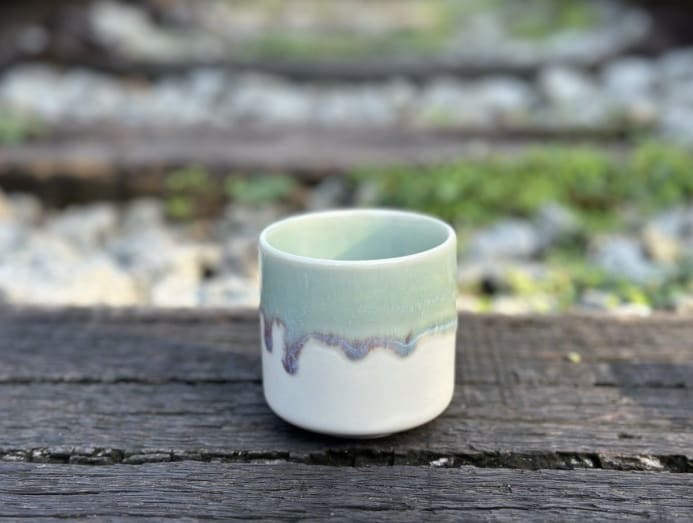
Over the next year, Lovatt worked on business set-up, licensing, shipping and logistics. It was a steep learning curve. In January this year, her products were finally ready.
However, one curveball she did not expect was that her pottery would require a Singapore Food Agency licence because it is used for food. She acquired this at the last minute, only to discover that the shipper forgot to note the licence on the form, causing the shipment to be detained at the dock when it first arrived in Singapore.
Even getting the fragile cargo to her condominium was a challenge. The shipping company simply left the items outside the guardhouse and she had to engage movers to carry them to her apartment where they now fill her living room, bedroom, home office and even bathroom.
But finally, in February, she ran her label’s first fair at a UWCSEA school event where her husband works as head of digital learning. Lovatt works for a UK-based life sciences consultancy as head of events and community.
“I was told by an entrepreneur friend that people don’t come to a school fair to buy pottery. Expect to sell five to 10 items. I was so nervous,” she recalled.
Lovatt and her husband lugged some 100 pieces of pottery to the fair in a rented car and borrowed trolley. She sold 96 pieces. People loved the products and were moved by its story.
“I cried afterwards. People really do care. It isn’t just like, a weird fantasy of mine,” she said.
In March, Lovatt launched her website. Through e-commerce and small fairs, she has since sold more than 492 pieces and provided 822 meals to street kids.

Starting the business also had a powerful impact on her kids, now three and five. “A couple of weeks ago, Sophia said to me, when it’s my birthday, I want my friends to give me money. I want to give the money to people who don’t have a home.
“I started welling up, and Tim was crying too. It meant so much that my five-year-old said that. When I asked her why, she said, because that is what you do with Lily and Sophia,” Lovatt said.
“That’s the point in doing this. It gives me hope for a kinder world.”
CNA Women is a section on CNA Lifestyle that seeks to inform, empower and inspire the modern woman. If you have women-related news, issues and ideas to share with us, email CNAWomen [at] mediacorp.com.sg.





